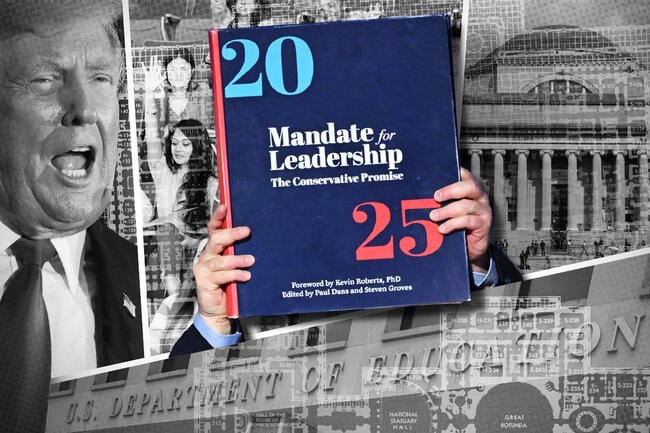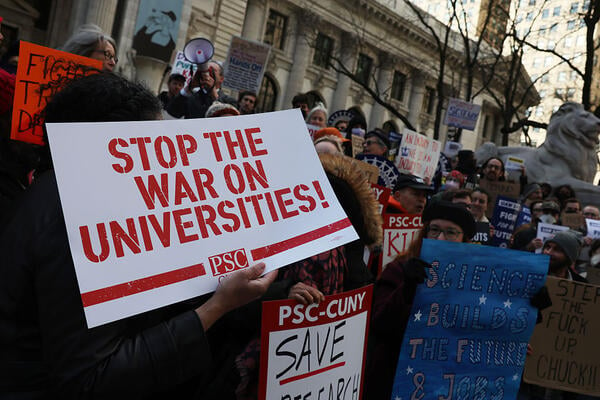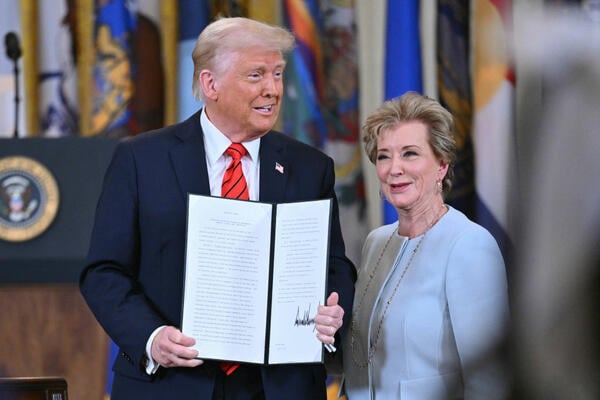You have /5 articles left.
Sign up for a free account or log in.

Photo illustration by Justin Morrison/Inside Higher Ed | Mandel Ngan/AFP/Getty Images | Alex Kent and Joe Raedle/Getty Images | Greggory DiSalvo and SDI Productions/iStock/Getty Images
President Donald Trump’s first three months in office have rocked higher education. From cracking down on diversity, equity and inclusion efforts to gutting the Education Department and deporting hundreds of international students, he has made clear that he intends to reclaim colleges from what he calls “Marxist maniacs.”
And all this has been accomplished during the president’s first 85 days in office. Over the next three years, Trump wants to reform the student loan system, roll back many of the Biden administration’s consumer protection regulations and gain the legislative support needed to close the Education Department altogether.
Collectively, the Trump administration’s early moves have caused chaos and uncertainty, stunning higher education leaders—some of whom doubted the president would follow through on his campaign promises at all. But the president’s intentions were clear throughout his time on the campaign trail, and his actions have closely aligned with the controversial recommendations made in Project 2025 and other key blueprints for the second administration.
So far, nearly one-third of the 50 or so higher ed policy recommendations in Project 2025 have been either fully or partially executed in Trump’s first 12 weeks, an Inside Higher Ed analysis found. Many of the other recommendations would require Congress to pass laws or the Education Department to issue new regulations, so following through on those items will take longer.
Project 2025, a sweeping 900-page manual spearheaded by the conservative Heritage Foundation, outlines a multitude of recommended changes across nearly all sectors of the federal government. But Trump, who denied involvement with the project, has outlined his own agenda in speeches and in the Republican Party platform. Other think tanks and policy analysts offered up their own policy proposals as well.
Not all of the Trump administration’s decisions fully adhere to Project 2025’s recommendations, but the core concept of each action is almost always suggested in one or more of the right-wing policy outlines Inside Higher Ed reviewed. For example, Project 2025 recommends moving the student loan program to the Department of Treasury, but Trump is planning to move it to the Small Business Administration.
Still, while it’s nearly impossible to predict what Trump will do and in what order, Project 2025 and other policy proposals offer substantial hints as to what’s likely coming around the bend, higher ed policy experts say.
In the next few weeks, experts are expecting an executive order that would prevent accreditors from setting DEI standards, lower the bar for new accreditors to gain approval from the department and make it easier for colleges to switch between existing accrediting agencies. In the long term, Project 2025 and other outlines call for the administration to privatize student loans, eliminate Public Service Loan Forgiveness, increase endowment taxes and completely abolish the Department of Education.
“The way I see it, Project 2025 really set out to destroy the federal role in education as we know it, and this administration has already taken major steps to weaken it,” said Sara Partridge, associate director of higher education policy at the Center for American Progress, a progressive think tank.
Inside Higher Ed reached out to both the Heritage Foundation and the White House for comment. Heritage declined to comment any further than “what is in the actual mandate,” and the Trump administration did not directly answer any questions.
Beyond Project 2025
So far, more than half of all Trump’s executive orders across all sectors of government align with recommendations from the Heritage Foundation, according to The Wall Street Journal. And the former Project 2025 director told Politico in March that Trump’s agenda so far has been “beyond [his] wildest dreams.”
Everything that they’ve done so far within their power—and I would say some of it exceeding their power—has been very much in line with what Project 2025 has called for.”
—Wesley Whistle, higher ed project director at New America
But it’s not just Project 2025 that offers hints about the president’s plans. Trump has made progress on nearly half of the 11 provisions included in the Republican Party’s platform for higher education, which was finalized last summer. The document, which makes broader, more high-level recommendations, called for the president to “pursue civil rights cases against schools that discriminate” and hold colleges accountable for allegations of antisemitism by revoking visas of “foreign nationals who support terrorism,” among other recommendations.
Another helpful blueprint for the first three months of Trump’s second term is a December opinion article from Max Eden—a former fellow at the American Enterprise Institute, a right-leaning think tank, who now works at the White House. Although more narrowly focused on specific issues than Project 2025, nearly half of Eden’s 28 recommendations have either been fully or partially completed, according to Inside Higher Ed’s analysis. And many of them overlap with the party platform and Project 2025, which he contributed to.
Of the three policy proposals included in Inside Higher Ed’s analysis, Eden’s op-ed is the only one that called for investigations into antisemitism and transgender students’ participation in athletics at specific institutions. It also suggested freezing access to grants and contracts in order to crack down on institutions that didn’t comply. (Project 2025 was published before the Israel-Hamas war began in 2023 and has little to say about the rise in reports of antisemitism on college campuses or how to hold colleges accountable.)
A little over a month before Trump took office, Eden said Education Secretary Linda McMahon should “start by taking a prize scalp” and “destroy” Columbia University for the way it handled pro-Palestinian protests on campus.
“The Education Department’s Office for Civil Rights should initiate a compliance review of every single decision Columbia made,” he wrote. “If Columbia doesn’t cooperate, McMahon could cut off its research grant funding.”
And that’s almost exactly what Trump did. On March 7, the federal antisemitism task force pulled $400 million from the Ivy League institution in Manhattan. The task force presented university administrators with a list of 10 demands that must be met in order to regain access to the federal funds. Columbia capitulated to all but one of the demands but has not yet seen the funding restored.
In addition to targeting Columbia, Eden also recommended capping how much grant funding could be used for costs indirectly related to research, deploying federal civil rights attorneys to supervise admissions at Harvard University and identifying every foreign student who “supported the protests” so that so-called border czar Tom Homan could revoke their visas. So far, the administration has revoked more than 1,000 student visas, according to an Inside Higher Ed analysis tracking the revocations.
And while Harvard was told it had to make “durable” changes to its admissions process in order to avoid losing federal funds, the Trump administration has not sent OCR officials to supervise the work of admissions staff. Harvard said Monday that it will not comply with Trump’s demands like Columbia did.
Inside Higher Ed reached out to Eden for comment, but he declined, saying all requests for comment must be submitted to the White House press office.

Photo by Spencer Platt/Getty Images
An ‘Undeniable’ Alignment
Project 2025 first became a lightning rod during the 2024 election. Democrats tried to tie Trump to the document’s most radical proposals, but some conservative policy analysts call the manual nothing more than a pen-to-paper amalgamation of the GOP’s core ideals. It shouldn’t matter whether Project 2025 has any influence over the Trump administration, they say.
Frederick Hess, director of education policy studies at AEI, doesn’t think Project 2025 is “worth any time” and any different from other think tank memos.
“It’s like saying the Center for American Progress’s annual four-year exercise was the playbook for the Biden administration in 2020—so what?” he said.
David Randall, director of research for the National Association of Scholars, a conservative advocacy organization, told Inside Higher Ed he was “delighted” with Trump’s actions so far but added that he wasn’t sure if the framing of this analysis would be “useful.”
“What matters is what the Trump administration Education Department has done, not how it relates to the recommendations of Project 2025,” Randall said.
But higher ed scholars and left-leaning think tank representatives say the alignment between the Trump administration’s early actions and policy manuals like Project 2025 is notable because of the unprecedented nature of their recommendations.
“Everything that they’ve done so far within their power—and I would say some of it exceeding their power—has been very much in line with what Project 2025 has called for,” said Wesley Whistle, higher ed project director at New America, a left-leaning think tank. “Voters will say that they don’t support these things, but Project 2025 is 100 percent the Trump administration’s playbook.”
Brendan Cantwell, a higher education professor at Michigan State University, said the influence of Project 2025 and the other outlines is undeniable.
“Maybe when they’re crafting executive orders, people in the White House are not opening up Project 2025, tracing their finger over the page, stopping and saying, ‘OK, this will be this one,’” Cantwell said. “But what is certainly very hard to dispute is that the record established in Project 2025 and by people like Max Eden … [is] being enacted quite clearly.”

One of President Trump’s key goals is to close the Education Department, an idea that was central to Project 2025 and part of the Republican Party’s platform.
In all three policy blueprints, Cantwell sees an aim to “dramatically intervene and upend established areas of policy and organizational life.” If anything, Trump is going beyond what Project 2025 outlined.
“While Project 2025, when it was written, seemed pretty radical and a pretty big departure from established policy, it was far more constrained in many ways than Trump has been, because it called on those established mechanisms of legislation and negotiated rule making.”
So What’s Next?
Regardless of political affiliation, higher ed policy experts largely agree that Trump’s actions over the last three months are just a foretaste of more substantial policy changes down the road.
Many of Trump’s early executive orders, which lay the groundwork for further legislative change, are bogged down in court. But if any make it out in one piece, they could fundamentally reshape the federal government’s role in higher education.
5 Actions That Require Congress
Congress is currently considering some actions suggested in Project 2025. These include:
- Eliminating the PLUS program
- Putting a cap on federal loans
- Raising the tax on university endowments
- Eliminating borrower safety net regulations
- Requiring colleges to pay back their students’ unpaid loans
In the meantime, the administration is moving forward with plans to rethink which employers qualify for the Public Service Loan Forgiveness program and planning to revise other regulations in order to “streamline and improve federal student aid programs.” And many experts say big changes to accreditation are looming as part of an effort to further constrain colleges. Overhauling accreditation is a goal that Trump has talked about, as have Eden, the Republican platform and Project 2025.
Project 2025 says the education secretary should refuse “to recognize all accreditors that abuse their power.”
And Trump said during the presidential campaign that he would fire “radical left” accreditors and strip colleges of access to federal support if they failed to address the harassment of Jewish students. Experts say that only accreditors can take away a college’s accreditation, and therefore its access to federal student aid, but the Trump administration has shown in the last few months how much power it can exert over an institution’s federal funding.
Over all, higher education experts note that because much of what Trump has done so far is in line with Project 2025, they expect more of the same in the months and years to come.
Whistle said the damage done by gutting the Education Department alone will take years to repair, and that it’s likely only the beginning of what Trump will do.
“It’s one of those things where they say, ‘The government’s broken, and so therefore we got to get rid of it,’” he said. “And I think there’s a risk that they will make it a self-fulfilling prophecy.”
If anything, Cantwell, of Michigan State, expects the Trump administration to continue going beyond what Project 2025 recommends. While Project 2025 aims to operate with nuance and gain legislative support and amend existing statutes, Trump has used a “blunt instrument.” It’s far more of an “I-declare-this-to-be-so approach,” he said.
The next three years will look a lot like what we’ve already seen, Hess of AEI echoed. “The Trump administration has hit the ground so aggressively in the first couple months that they’ve actually previewed a lot of what we can expect.”




